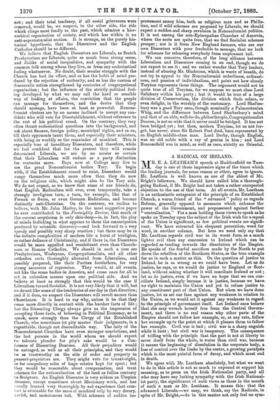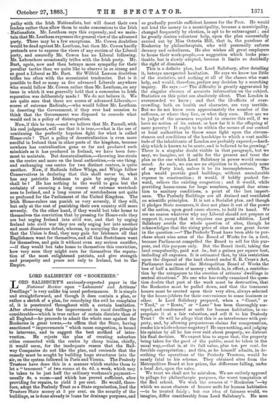A RADICAL ON IRELAND.
ME. A. LEATHAM'S speech at Huddersfield on Tues- day is one of those impressive signs of the times which the leading journals, for some reason or other, agree to ignore. Mr. Leathern is well known as one of the ablest of Mr. Bright'S followers. We should have called him a thorough- going Radical, if Mr. Bright had not taken a rather unexpected objection to the use of that term. At all events, Mr. Leatham is an enthusiastic antagonist of the principle of an Established Church, a warm friend of the " advanced " policy as regards Reform, generally opposed to measures which enhance the power of the Government, and prepossessed against farther "centralisation." For a man holding these views to speak as he spoke on Tuesday upon the subject of the Irish wish for a repeal of the Union is significant, as few political events are signifi- cant. We have extracted his eloquent peroration, word for word, in another column. But here we need only say that Mr. Leathern regards civil war in its worst form as a much lighter evil than any concession to Ireland which can be regarded as tending towards the dissolution of the Empire. He speaks of the fearful sacrifices made by the North to put down the rebellion of the Southern States, as the true example for us in such a matter as this. On the question of justice to Ireland, he is as strong as we could have been. Let us do justice, he says, as we would do justice to England or Scot- land, without asking whether it will conciliate Ireland or not ;, let us do justice, even if we have no hope that we can con- ciliate Ireland, simply because it is justice, because we have no right to maintain the Union and yet to refuse justice to. .any constituent part of that Union. But when we have done 5ustice, let us set our face against any weakness in relation to the Union, as we would set it against any weakness in regard. to the principle of government itself. Let Ireland once believe ;that she may wrench herself free from the Central Govern,. ment, and there is no real reason why other parts of the Empire should not follow her example, or, at any rate, follow her example up to the point at which it pleases them to follow her example. Civil war is bad ; civil war is a sharp anguish while it lasts ; but civil war is temporary. The consequence of trifling with the principle that the part is not at liberty to sever itself from the whole, is worse than civil war, because it means the beginning of dissolution in the corporate body, a loss of control over the limbs by the centre, a growing paralysis which is the most painful form of decay, and which must end jai death.
We agree with Mr. Leatham absolutely, but what we want to do in this article is not so much to expound or support his meaning, as to press on the Irish Nationalist party, and all who may have any lurking sympathy with the Irish National- ist party, the significance of such views as these in the mouth of such a man as Mr. Leatham. It means this : that the advanced Liberals,—we may, we think, say the Radicals, in spite of Mr. Bright,—do in this matter not only feel no sym.. pathy with the Irish Nationalists, but will desert their own leaders rather than allow them to make concessions to the Irish Nationalists. Mr. Leatham says this expressly, and we main- tain that Mr. Leatham expresses the general view of the advanced party. There may be a few exceptions. Mr. Cowen doubtless would be dead against Mr. Leatham, but then Mr. Cowen hardly pretends now to express the views of any section of the Liberal party, and assuredly Mr. Cowen has no Liberal following. Mr. Labouchere occasionally trifles with the Irish party. Mr. Burt, again, now and then betrays more sympathy for their peculiar tactics than we quite like to observe in so strong and so good a Liberal as Mr. Burt. Sir Wilfrid Lawson doubtless trifles too often with the secessionist tendencies. But is it possible to find so many as five advanced Liberals anywhere -who would follow Mr. Cowen rather than Mr. Leatham, on any issue in which it was generally held that a concession to Irish separation was deliberately made ? We do not believe it. We are quite sure that there are scores of advanced Liberals,— scores of extreme Radicals,—who would follow Mr. Leatham in deserting the Government, if they ever had occasion to think that the Government was disposed to concede what would end in a policy of disintegration.
Now, if this be true,—and we believe that Mr. Parnell, with his cool judgment, will see that it is true,—what is the use of continuing the perfectly hopeless fight for what is called Home-rule ? That a policy of decentralisation is even more needful in Ireland than in other parts of the kingdom, because nowhere has centralisation gone so far and produced such mischiefs as it has produced in Ireland, we have been fore- most to maintain. But decentralisation,—throwing less strain on the centre and more on the local authorities,—is one thing, and exchanging one centre for two distinct centres, is quite another. Now, if Radicals follow Whigs, and Whigs follow Conservatives in declaring that this shall never be, what has any patriotic Irishman to gain by saying that it shall be ? He has nothing in the world to gain but the certainty of ensuring a long course of extreme wretched- ness to Ireland, and a long course of wretchedness not quite so profound for the Parliament of the United Kingdom. The Irish Home-rulers can punish us very severely, if they will, but only at the cost of punishing their own country still more severely. On the other hand, if they -would but take home to themselves the conviction that by pressing for Home-rule they are but urging Ireland into civil war, and that by urging Ireland into civil war they are only urging her into another and most disastrous defeat, whereas, by accepting the principle that the Union is final, they may gain for Irishmen all that Englishmen want for themselves, and all that Scotchmen want for themselves, and gain it without even any serious sacrifice, —if they would but take home to themselves this conviction, how very soon they might earn for themselves the reputa- tion of the most enlightened patriots, and give strength. and prosperity and peace not only to Ireland, but to the Empire.



































 Previous page
Previous page